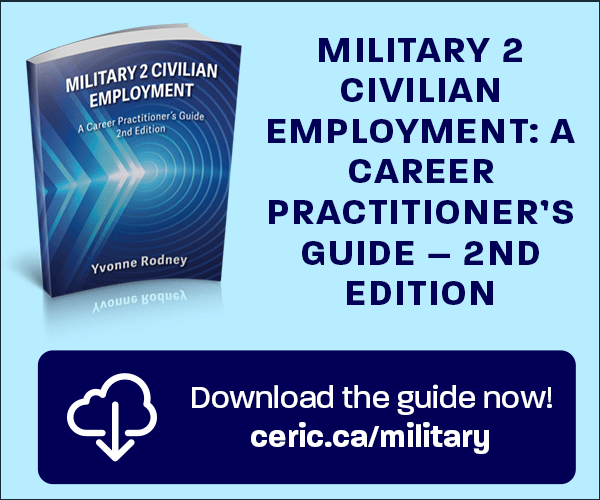Clinical Supervision in Group Career Counselling: A Qualitative Analysis of Career Development of Supervised Persons
DOI:
https://doi.org/10.53379/cjcd.2023.371Keywords:
Professional development, Clinical supervision, Group career counselling, Triadic supervision, Training for guidance counsellorsAbstract
Although clinical supervision is recognised as central to initial guidance training, the current state of knowledge is limited. In order to describe the professional development process experienced by supervisees during clinical supervision meetings in group career counselling, this qualitative research was conducted with eight supervisees and two supervisors in a graduate career counselling training programme at a Canadian university. Using the Integrative Developmental Model of Supervision (Stoltenberg et al, 1988; Stoltenberg and McNeill, 2010; McNeill and Stoltenberg, 2016), thematic analysis of recordings of supervision meetings and critical incidents identified by supervisees highlights three themes within which the professional development process manifested itself: (a) adapting to novelty in intervention, (b) from reflection-on-action to reflection-in-action, and (c) coping with complexity in intervention. Implications for clinical supervision and initial training are discussed, and recommendations for future research are proposed.
References
Aponte, H. J., Powell, F. D., Brooks, S., Watson, M. F., Litzke, C., Lawless, J., et Johnson, E. (2009). Training the person of the therapist in an academic setting. Journal of Marital and Family Therapy, 35, 381–394. https://doi.org/10.1111/j.1752-0606.2009.00123.x
Bennett-Levy, J. (2019) Why therapists should walk the talk: The theoretical and empirical case for personal practice in therapist training and professional development. Journal of Behavior Therapy and Experimental Psychiatry, 62, 133–145. https://doi.org/10.1016/j.jbtep.2018.08.004
Bernard, J. M. et Goodyear, R. K. (2019). Fundamentals of clinical supervision (6e éd.). Pearson.
Bilodeau, C., Savard, R., Bellehumeur, C., Gazzola, N., Koszycki, D. et Thériault, A. (2018). Informing pedagogical practices for training graduate psychotherapy students: A look at the role of the positive psychology framework in the supervisory context [demande de subvention adressée au CRSH].
Borders, L. D. et Brown, L. L. (2005). The new handbook of counseling supervision. Erlbaum.
Borders, L. D. (2006). Snapshot of clinical supervision in counseling and counselor education. A five-year review. The Clinical Supervisor, 24(1-2), 69-113. https://doi.org/10.1300/J001v24n01_05
Borders, L. D., Welfare, L. E., Greason, P. B., Paladino, D. A., Mobley, A. K., Villalba José A. et Wester, K. L. (2012). Individual and triadic and group: Supervisee and supervisor perceptions of each modality. Counselor Education and Supervision, 51(4), 281–295. https://doi.org/10.1002/j.1556-6978.2012.00021.x
Bronson, K. M. (2010). Supervision of career counseling. Dans L. J. Bradley et N. Ladany (dir.). Counselor supervision: Principles, process, and practice (4e éd., p. 261–286). Taylor & Francis.
Castonguay, L. G., et Hill, C. E. (2017). How and why are some therapists better than others? Understanding therapist effects. American Psychological Association.
Choudhury, T. K., John, K. et Nanavaty, N. (2019). Impacts of challenging life experiences on professional development in graduate trainees. Journal of Psychotherapy Integration, 29(2), 108–118. https://doi.org/10.1037/int0000151
Cournoyer, L., Lepire, C. et Lachance, L. (2018). Points de convergence et de distinction entre supervision clinique en counseling et celle spécifique aux conseillers d’orientation québécois. Revue d’éducation, 5(3), 45-50.
Creswell, J. W. et Poth, C. N. (2018). Qualitative inquiry & research design: Choosing among five approaches (4e éd.). SAGE
Douville, L. (2010). Contribution de la supervision professionnelle à la formation des psychothérapeutes. Revue québécoise de psychologie, 31(2), 253–270.
Dubois, A. et Goyer, L. (2017). Conclusion : Quelques pistes de réflexion pour maintenir le développement de la réflexion. Carriérologie, 13(3), 333–335.
Falender, C. A. et Shafranske, E. P. (2010). Psychotherapy-based supervision models in an emerging competency-based era: A commentary. Psychotherapy Theory, Research, Practice, Training, 47(1), 45–50. https://doi.org/10.1037/a0018873
Goyer, L. et Dubois, A. (2017). La supervision universitaire en counseling et orientation : enjeux et pistes de réflexion. Carriérologie, 13(3), 253–274.
Guédon, M.-C., Savard, R., Le Corff, Y. et Yergeau, É. (2011). Tests à l’appui : pour une intervention intégrée de la psychométrie en counseling de carrière (2e éd.) Septembre éditeur.
Heppner, P. P. et Roehlke, H. J. (1984). Differences among supervisees at different levels of training: Implications for a developmental model of supervision. Journal of Counseling Psychology, 31, 76–90. https://doi.org/10.1037/0022-0167.31.1.76
Heppner, P. P., Wampold, B. E., Owen, J., Thompson, M. N. et Wang, K. (2016). Research design in counseling (4e éd.). Cengage Learning.
Ladany, N. et O’Shaughnessy, T. (2015). Training and supervision in career counseling. Dans P. J. Hartung, M. L. Savickas et W. B. Walsh (dir.), APA handbook of career intervention, Vol. 1. Foundations (p. 375–387). American Psychological Association. https://doi.org/10.1037/14438-020
Lara, T. M., Kline, W. B. et Paulson, D. (2011). Attitudes regarding career counseling: Perceptions and experiences of counselors‐in‐training. The Career Development Quarterly, 59(5), 428–440. https://doi.org/10.1002/j.2161-0045.2011.tb00969.x
Lecomte, C. et Savard, R. (2017). La supervision en counseling de carrière : un processus essentiel au développement de la compétence et de l’efficacité professionnelle. Carriérologie, 13(3), 203–226.
Leszcz, M. (2011). Psychotherapy supervision and the development of the psychotherapist. Dans R. H. Klein, H. S. Bernard et V. L. Schermer (dir.), On becoming a psychotherapist: A personal and professional journey (p. 114–143). Oxford University Press.
McNeill, B. W. et Stoltenberg, C. D. (2016). Supervision essentials for the integrative developmental model. American Psychological Association.
Nicoleta, L. (2015). Supervision in career counseling – theoretical framework and practical benefits. Procedia – Social and Behavioral Sciences, 180, 1094–1101. https://doi.org/10.1016/j.sbspro.2015.02.214
Orlinsky, D. E., Botermans, J.-F., et Rønnestad, M. H. (2001). Towards an empirically grounded model of psychotherapy training: Four thousand therapists rate influences on their development. Australian Psychologist, 36(2), 139–148. https://doi.org/10.1080/0005 0060108259646
Orlinsky, D. E. et Rønnestad, M. H. (2005). How psychotherapists develop: A study of therapeutic work and professional growth. American Psychological Association. https://doi.org/10.1037/11157-000
Paillé, P. et Mucchielli, A. (2021). L’analyse qualitative en sciences humaines et sociales (5e éd.). Armand Colin.
Parcover, J. A. et Swanson, J. L. (2013). Career counselor training and supervision: Role of the supervisory working alliance. Journal of Employment Counseling, 50, 166–178. https://doi.org/10.1002/j.2161-1920.2013.00035.x
Pierce, L. M. (2016). Overwhelmed with the burden of being myself: A phenomenological exploration of the existential experiences of counselors-in-training. Journal of Humanistic Counseling, 55, 136–150. https://doi.org/10.1002/johc.12030
Plantade-Gipch, A. (2017). Former les futurs psychothérapeutes à la relation : la réflexion-en-action dans l’alliance thérapeutique. Pratiques psychologiques, 23(3), 217–231. https://doi.org/10.1016/j.prps.2017.05.001
Ratcliff, D. (2003). Video methods in qualitative research. Dans P. M. Camic, J. E. Rhodes et L. Yardley (dir.), Qualitative research in psychology: Expanding perspectives in methodology and design (p. 113–129). American Psychological Association. https://doi.org/10.1037/10595-007
Ray, D. et Altekruse, M. (2000). Effectiveness of group supervision versus combined group and individual supervision. Counselor Education and Supervision, 40(1), 19–30. https://doi.org/10.1002/j.1556-6978.2000.tb01796.x
Regas, S. J., Bakaly, J. W., Doonan, R. L. et Kostick, K. M. (2017). Including the self-of-the-therapist in clinical training. Couple and Family Psychology: Research and Practice, 6(1), 18–31. https://doi.org/10.1037/CFP0000073
Ridley, C. R., Mollen, D. et Kelly, S. M. (2011). Beyond microskills: Toward a model of counseling competence. The Counseling Psychologist, 39(6), 825–864. https://doi.org/10. 1177/0011000010378440
Riva, M. T. (2011). Supervision of group counseling. Dans R. K. Conyne (dir.), The Oxford handbook of group counseling (p. 370–382). https://doi.org/10.1093/xfordhb/97801953 94450.013.0020
Robertson, S. E. et Borgen, W. A. (2016). CCPA accreditation of counsellor education programs in Canada: An historical perspective. Canadian Journal of Counselling and Psychotherapy, 50(3), 259–277. https://cjc-rcc.ucalgary.ca/article/view/61135
Robinson, N. L., Schweitzer, R. D. et O’Connor, E. L. (2019). Early reflections on becoming a therapist: Development of reflective practice in clinical training programmes in an Australian context. Counselling and Psychotherapy Research, 19(5), 388–398. https://doi.org/10.1002/capr.12255
Rønnestad, M. H., Orlinsky, D. E., Schröder, T. A., Skovholt, T. M. et Willutzki, U. (2018). The professional development of counsellors and psychotherapists: Implications of empirical studies for supervision, training and practice. Counselling & Psychotherapy Research, 19(5), 1–17. https://doi.org/10.1002/capr.12198
Rønnestad, M. H., Orlinsky, D. E. et Wiseman, H. (2016). Professional development and personal therapy. Dans J. C. Norcross, G. R. VandenBos, D. K. Freedheim et L.F. Campbell (dir.), APA handbook of clinical psychology: Education and profession (p. 223–235). American Psychological Association. https://doi.org/10.1037/14774-015
Rønnestad, M. H. et Skovholt, T. M. (2003). The journey of the counselor and therapist: Research findings and perspectives on professional development. Journal of Career Development, 30(1), 5–44. https://doi.org/10.1177/0894 84530303000102
Salter, M. et Rhodes, P. (2018). On becoming a therapist: A narrative inquiry of personal-professional development and the training of clinical psychologists. Australian Psychologist, 53(6), 486–492. https://doi.org/10.1111/ap.12344
Schön, D. A. (1987). Educating the reflexive practitioner. Jossey-Bass.
Spruill, J., Rozensky, R. H., Stigall, T. T., Vasquez, M., Bingham, R. P. et Olvey, C. (2004). Becoming a competent clinician: Basic competencies in intervention. Journal of Clinical Psychology, 60(7), 741–754. https://doi.org/10.1002/jclp.20011
Stoltenberg, C. D. (2005). Enhancing professional competence through developmental approaches to supervision. The American Psychologist, 60(8) 857–864. https://doi.org/10.1037/0003-066X.60.8.85
Stoltenberg, C. D., McNeill, B. W. et Delworth, U. (1998). IDM: An integrated developmental model for supervising counselors and therapists. Jossey-Bass.
Stoltenberg, C. D. et McNeill, B. W. (2010). IDM supervision: An integrative developmental model for supervising counselors and therapists (3e éd.). Routledge.
Sultana, R. G. (2009). Competence and competence frameworks in career guidance: Complex and contested concepts. International Journal for Educational and Vocational Guidance, 9, 15–30. https://doi.org/10.1007/s10775-008-9148-6
Wampold, B. E. (2015). How important are the common factors in psychotherapy? An update. World Psychiatry, 14(3), 270–277. https://doi.org/10.1002/wps.20238
Watkins, C. E., Jr. (2012). On demoralization, therapist identity development, and persuasion and healing in psychotherapy supervision. Journal of Psychotherapy Integration, 22(3), 187-205. https://doi.org/10.1037/a0028870
Wilson, H. M. N., Davies, J. S. et Weatherhead, S. (2016). Trainee therapists’ experiences of supervision during training: a meta-synthesis. Clinical Psychology & Psychotherapy, 23(4), 340–351. https://doi.org/10.1002/cpp.1957
Worthington, E. L., Jr. (2006). Changes in supervision as counselors and supervisors gain experience: A review. Training and Education in Professional Psychology, S(2), 133-160. https://doi.org/10.1037/1931-3918.S.2.133

Published
How to Cite
Issue
Section
License
Copyright (c) 2023 Canadian Journal of Career Development

This work is licensed under a Creative Commons Attribution-NonCommercial-NoDerivatives 4.0 International License.
















